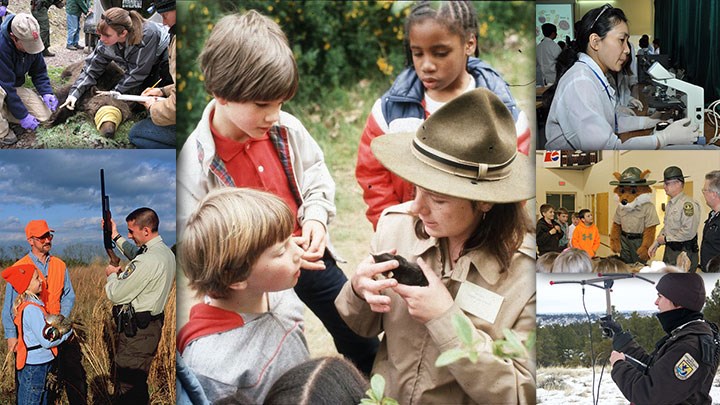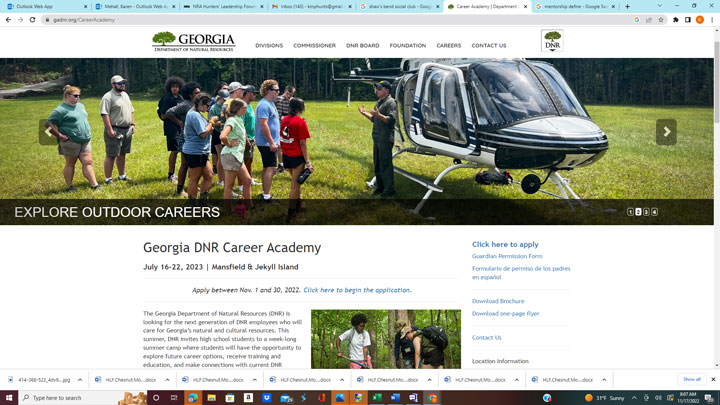
by Chris Chaffin - Monday, November 21, 2022

Hunters and wildlife management agencies are inexorably bound. In this modern age, you just can’t have one without the other.
To be sure, the two don’t always see eye-to-eye but, ultimately, the welfare and sheer existence of wildlife—and the opportunities to hunt—depend on sound scientific management (the agencies) and the funding to implement the science (the hunters), including the social science aspects necessary to effect clear communication between these partners.
Much has been written about how one becomes a hunter. But what paths do game wardens, biologists, researchers, administrators, educators and public affairs specialists trek to become professional wildlife managers? And, how do interested folk learn about those career opportunities?
For ages, the primary method of learning was via direct contact with working professionals: a game warden takes time to talk with a young hunter, a state wildlife agency spokesman does a school program featuring a live animal, etc. Contacts evolved to include newspaper and magazine articles, radio and TV spots. And today, it’s social media, albeit with only “sound bite” details.
Internet searches yield a wealth of information but none of them “feel” so deeply associated with wildlife work. And, unquestionably, the feelings and the caring are integral components of why wildlife professionals choose their workplace. The places where these folks work—agencies, organizations, companies, associations—well recognize the growing disconnect between general populations, the land and wildlife, and are developing new ways of enabling people to learn about wildlife jobs, job requirements and job duties.
One notable example in this growing effort is the Georgia DNR (Department of Natural Resources) Career Academy, a week-long, overnight program for current ninth, 10th and 11th graders designed to introduce students to future careers with the DNR. The Career Academy’s activities include taking part in electrofishing and fish habitat creation, prescribed burns and land management, state park hospitality and administration, conservation law enforcement, saltwater fisheries surveys and methods, and more. Throughout the week, students will interact with full-time DNR staff and have the chance to ask questions, learn about professional paths, such as becoming a game warden, park manager, or a wildlife, fisheries or marine technician, and education requirements.

The 2023 Career Academy will be conducted July 16-22 in Mansfield and Jekyll Island. Students interested in taking advantage of this hands-on educational opportunity must act quickly as applications are due by Nov. 30. Registration information can be found at https://gadnr.org/CareerAcademy.
A quick Internet search of an individual state agency’s or U.S. Fish and Wildlife website will, almost without exception, provide a direct link to information about what kinds of positions are available, and what the requirements are to get one. The majority of wildlife jobs now require a college degree and work-related experience. Website job posting or recruitment sites also offer an overview of current job needs and opportunities.
Sportsmen browsing outdoor websites often see announcements for hiring or training of wildlife law enforcement officers. Good examples of such sites include those in Iowa and Indiana.
There may be no more crucial link between sportsmen and the management agencies than the Conservation Officer (CO)/Game Warden (GW). The CO job is a complex and challenging position. In many states, and at the federal level as well, these men and women act as not only law enforcement officers but also as biologists, information officers, educators, animal and human rescue teams, media contacts, researchers and much more. Many oversee large expanses of wildlands, while others may work in heavily populated areas. So, while the challenges are many, so are the rewards.
The Conservation Officer position is one of the most highly sought after jobs in wildlife and it takes a dedicated, strongly motivated, well-trained individual to handle the demands of today’s sophisticated game warden position. Necessary … yes! Challenging … yes! Highly rewarding career … yes!
About the Author
An outdoor communicator for more than 40 years, Chris Chaffin has worked with multiple outdoor companies, including serving two terms as treasurer of the Professional Outdoor Media Association before taking on the roles of vice president, president and chairman of the board. In 2007, he launched the communications consulting company Chaffin Communications Inc. With support from the Outdoor Adventure Dream Giveaway, in 2012 he founded the Outdoor Adventure Conservation Fund, a Florida non-profit encouraging more people to get involved in traditional outdoor activities.
E-mail your comments/questions about this site to:
[email protected]
